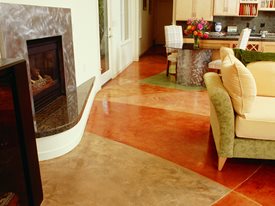
Concrete floors don't harbor allergens or release harmful chemicals. Bomanite Corporation in Madera, CA
Avoiding Carpet
Concrete floors are an allergy free alternative to wall-to-wall carpeting. In fact, when it comes to poor indoor air quality, carpeting can be one of the worst offenders. If you're looking for allergy relief, removing your carpeting and opting for decorative concrete floor is a great option.
Find concrete floor contractors near me.
First, carpet is difficult to keep clean and often becomes a haven for dust mites and other allergens. Tens of millions of these little critters can live in a square foot of carpeting, and they aren't removed by routine vacuuming. According to Mayo Clinic, an allergy to dust mites can trigger symptoms similar to a cold or hay fever, including congestion and frequent sneezing. Dust mites can even cause a form of asthma, with chronic shortness of breath, coughing and chest tightness. To minimize exposure, Mayo recommends removing carpeting where possible. Bare concrete floors won't harbor dust mites and are easy to keep clean with periodic dusting or damp mopping.
Concrete Floors Great for Those with Allergies
Time: 01:24
Harris discusses the benefits of concrete floors for those with allergies.
Removing Carpet before Installing Concrete Floors
Time: 02:24
Tips on installing concrete floors if you have carpet.